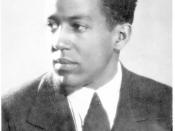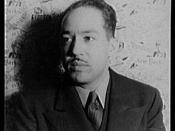Poem "I, Too Sing America " is considered to be very characteristic for radical poetry of Langston Hughes. The majority of literary critiques and historians refer to Hughes as one of the first American poets, who set the standards and examples how to challenge the post-World War I ethnic nationalism. His poetry contributed and shaped to some extent the politics of the Harlem Renaissance. In analysis of Black poetry Charles S. Johnson wrote that the new racial poetry of the Negro is the expression of something more than experimentation in a new technique; it marks the birth of a new racial consciousness and self-conception. It is first of all a frank acceptance of race, but the recognition of this difference without the usual implications of disparity (145). Being acquainted with many Hughes's works, for instance "Our Land," "The Negro Speaks of Rivers," and of course "I, Too Sing America," Johnson confirmed that poet had a strong sense of "race pride" and characterized Hughes's poetry to be "without doubt the finest expression of this new Negro Poetry" (145).
Some literary critiques refer to Hughes's poem "I Too Sing America" as radical poetry. However, if in this poem Hughes chose to sacrifice artistry for politics, it was not because the two are mutually exclusive. The main reason for such Hughes's technique is that the blues aesthetic of his early poems embraced a form of nationalism he could no longer abide (147). Hughes himself concludes that the chief responsibility of the black writer was to produce a racial literature drawn from African American life and culture. "We younger Negro artists who create," Hughes wrote, "now intend to express our individual dark-skinned selves without fear or shame" (309). Onwuchekwa Jemie, who identified Hughes as a black nationalist, notes that "Hughes's insistence on a distinct...



Pretty Clear
Hey I like the Opinions offered in this Essay, some good critical points and secondary information...Really good.
0 out of 0 people found this comment useful.